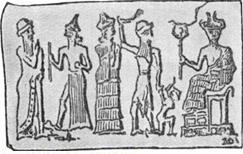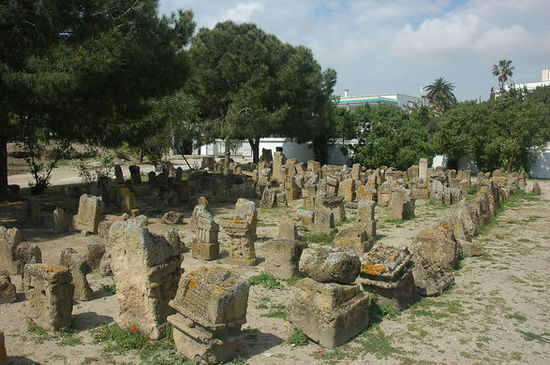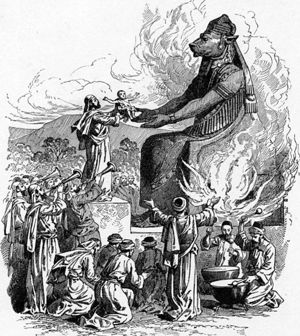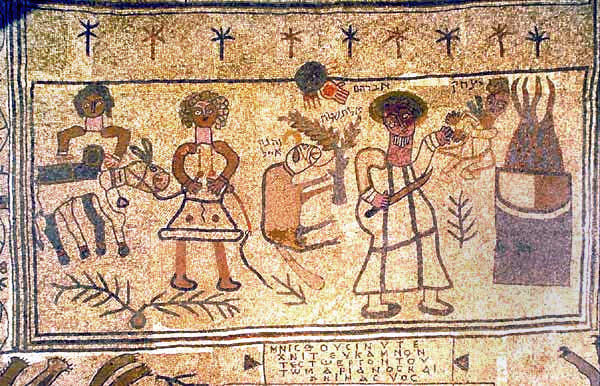Category:Child Sacrifice (subject)
Child Sacrifice is the ritualistic killing of children (especially, the firstborn) in order to please or appease a deity.
Overview
The practice of child sacrifice was widespread in the Ancient Near East and the Mediterranean area. Precisely because children were among the most precious properties of a family, it seemed appropriate to offer them as a sacrifice to the gods, especially in times of crisis and war. In particular the most important child (the first born male) was said to belong to gods and had to be given (sacrificed) to them.
There were special places reserved to child sacrifice (called Topheth in Hebrew) and to the burial of the victims. The god presiding the sacrifice was addressed as the Moloch (the same root as melekh, "king"). As in the case of animals, the victim was ritually killed, by cutting the jugular vein, and the corpse burnt as an holocaust.
This is the way in which in the nineteenth century, people (erroneously) imagined the ancient ritual of child sacrifice to Moloch, with the child being thrown directly into the flames
movie "Cabiria" (1914) (25:30 to 27:30)
In the Hebrew Bible there are explicit references to such a practice by nearby people.
- 2 Kings 3:27. [The king of Moab] took his eldest son and offered him for a burnt-offering upon the walls.
There is strong evidence that the practice was shared by ancient Israelites in pre-exilic times.
Child sacrifice of the firstborn is explicitly commanded in Exodus 22:
- Ex 22:29: 29 You shall not delay to offer the first of your ripe fruits, and of your liquors: the firstborn of your sons shall you give unto me. Likewise shall you do with your oxen, and with your sheep: seven days it shall be with his dam; on the eighth day you shalt give it me.
In the story of the Exodus God shows his power by killing the firstborn of the Egyptians, thus showing that they belong to him. "Every firstborn son in Egypt will die, from the firstborn son of Pharaoh, who sits on the throne, to the firstborn son of the female slave, who is at her hand mill, and all the firstborn of the cattle as well. (Ex 11:5).
We have stories of child sacrifice in Israel:
It is said that Jephthah sacrificed his daughter to win the favor of God in battle:
Jephthah (Judges 11) -- "Jephthah made a vow to the Lord, and said, “If you will give the Ammonites into my hand, 31 then whoever comes out of the doors of my house to meet me, when I return victorious from the Ammonites, shall be the Lord’s, to be offered up by me as a burnt offering.” 32 So Jephthah crossed over to the Ammonites to fight against them; and the Lord gave them into his hand... 34 Then Jephthah came to his home at Mizpah; and there was his daughter coming out to meet him with timbrels and with dancing. She was his only child; he had no son or daughter except her. 35 When he saw her, he tore his clothes, and said, “Alas, my daughter! You have brought me very low; you have become the cause of great trouble to me. For I have opened my mouth to the Lord, and I cannot take back my vow.” 36 She said to him, “My father, if you have opened your mouth to the Lord, do to me according to what has gone out of your mouth, now that the Lord has given you vengeance against your enemies, the Ammonites.” 37 And she said to her father, “Let this thing be done for me: Grant me two months, so that I may go and wander[b] on the mountains, and bewail my virginity, my companions and I.” 38 “Go,” he said and sent her away for two months. So she departed, she and her companions, and bewailed her virginity on the mountains. 39 At the end of two months, she returned to her father, who did with her according to the vow he had made. She had never slept with a man. So there arose an Israelite custom that 40 for four days every year the daughters of Israel would go out to lament the daughter of Jephthah the Gileadite.
The books of King attested that child sacrifices were indeed practiced in ancient Israel:
1 King 16:34 -- In the days [of King Ahab of Israel], Hiel of Bethel built [the city of Jericho]; he laid its foundation at the city of Abiram his firstborn, and set up its gates at the cost of his youngest son, according to the word of the Lord, which he spoke by Joshua son of Nun (see Joshua 6:26).
2 Kings 16:3 -- [King Ahaz of Judah] walked in the way of the kings of Israel and even sacrificed his son in the fire, according to the abominations of the nations whom the LORD had driven out before the Israelites. See 2 Chronicles 28:3 : "Moreover, Ahaz burned incense in the Valley of Hinnom and sacrificed his sons in the fire, according to the abominations of the nations whom the LORD had driven out before the Israelites."
2 Kings 21:6 -- [King Manasseh of Judah] sacrificed his own son in the fire, practiced sorcery and divination, and consulted mediums and spiritists. He did great evil in the sight of the LORD, provoking Him to anger.
According to the Jewish tradition the practice of child sacrifices was eventually abolished by King Josiah as part of his religious reforms around the year 622 (7th cent, BCE).
2 Kings 23:10 - [King Josiah] also desecrated Topheth in the Valley of Ben-hinnom so that no one could sacrifice his son or daughter in the fire to Molech.
The practice came now to be condemned by the worshipers of YHWH, as a "foreign" ritual.
Jeremiah 7:31 - They have built the high places of Topheth, which is in the valley of the son of Hinnom, to burn their sons and their daughters in the fire; which I didn't command, nor did it come into my mind.
The practice was condemnedIn Leviticus 18:21, 20:3 and Deuteronomy 12:30-31, 18:10, the Torah contains a number of imprecations against and laws forbidding child sacrifice (and human sacrifice in general) as a "foreign" idolatrous practice.
- Do not give any of your children to be sacrificed to Molek, for you must not profane the name of your God. I am the LORD. (Lev 18:21)
- I myself will set my face against them, and will cut them off from the people, because they have given of their offspring to Molech, defiling my sanctuary and profaning my holy name. (Lev 20:3)
- 31 You must not do the same for the Lord your God, because every abhorrent thing that the Lord hates they have done for their gods. They would even burn their sons and their daughters in the fire to their gods. (Dt 12:31)
- No one shall be found among you who makes a son or daughter pass through fire (Deut 18:10a).
The story of the Binding of Isaac was meant to put an end to the ritual of child sacrifice, at a time when child sacrifices were the norm worldwide:
- After these things God tested Abraham. He said to him, “Abraham!” And he said, “Here I am.” 2 He said, “Take your son, your only son Isaac, whom you love, and go to the land of Moriah, and offer him there as a burnt offering on one of the mountains that I shall show you.” 3 So Abraham rose early in the morning, saddled his donkey, and took two of his young men with him, and his son Isaac; he cut the wood for the burnt offering, and set out and went to the place in the distance that God had shown him. 4 On the third day Abraham looked up and saw the place far away. 5 Then Abraham said to his young men, “Stay here with the donkey; the boy and I will go over there; we will worship, and then we will come back to you.” 6 Abraham took the wood of the burnt offering and laid it on his son Isaac, and he himself carried the fire and the knife. So the two of them walked on together. 7 Isaac said to his father Abraham, “Father!” And he said, “Here I am, my son.” He said, “The fire and the wood are here, but where is the lamb for a burnt offering?” 8 Abraham said, “God himself will provide the lamb for a burnt offering, my son.” So the two of them walked on together.
- 9 When they came to the place that God had shown him, Abraham built an altar there and laid the wood in order. He bound his son Isaac, and laid him on the altar, on top of the wood. 10 Then Abraham reached out his hand and took the knife to kill[a] his son. 11 But the angel of the Lord called to him from heaven, and said, “Abraham, Abraham!” And he said, “Here I am.” 12 He said, “Do not lay your hand on the boy or do anything to him; for now I know that you fear God, since you have not withheld your son, your only son, from me.” 13 And Abraham looked up and saw a ram, caught in a thicket by its horns. Abraham went and took the ram and offered it up as a burnt offering instead of his son. 14 So Abraham called that place “The Lord will provide”;[b] as it is said to this day, “On the mount of the Lord it shall be provided.”[c]
- 15 The angel of the Lord called to Abraham a second time from heaven, 16 and said, “By myself I have sworn, says the Lord: Because you have done this, and have not withheld your son, your only son, 17 I will indeed bless you, and I will make your offspring as numerous as the stars of heaven and as the sand that is on the seashore. And your offspring shall possess the gate of their enemies, 18 and by your offspring shall all the nations of the earth gain blessing for themselves, because you have obeyed my voice.” 19 So Abraham returned to his young men, and they arose and went together to Beer-sheba; and Abraham lived at Beer-sheba.
The age of Isaac is not determined in the text (according to Josephus he was 25 years old) but Jewish and Christian iconography have commonly depicted him as a young boy:
Child sacrifice is replaced by obedience. It is the same answer given in the Book of Micah 6:6-7, where once again the question about the legitimacy of child sacrifices is explicitly asked:
- "'Shall I give my firstborn for my sin, the fruit of my body for the sin of my soul?', 'He has shown all you people what is good. And what does Yhwh require of you? To act justly and to love mercy and to walk humbly with your God.'
The Israelites retained the idea that all firstborns belong to God (this concept not abolished), but the sacrifice of the firstborns was replaced by an offer to the Temple:
- The Lord said to Moses: 2 Consecrate to me all the firstborn; whatever is the first to open the womb among the Israelites, of human beings and animals, is mine ... if you do not redeem it, you must break its neck. Every firstborn male among your children you shall redeem. (Ex 13:1-2,13).
The redemption of the fistborn is linked to the experience of the Exodus:
So it shall be, when your son asks you in time to come, saying, "What is this?" that you shall say to him, "By strength of hand the Lord brought us out of Egypt, out of the house of bondage. And it came to pass, when Pharaoh was stubborn about letting us go, that the Lord killed all the firstborn in the land of Egypt, both the firstborn of man and the firstborn of animal. Therefore I sacrifice to the Lord all males that open the womb, but all the firstborn of my sons I redeem." It shall be as a sign on your hand and as frontlets between your eyes, for by strength of hand the Lord brought us out of Egypt. (verses 14-16)
All the firstborn of your sons you shall redeem. And none shall appear before Me empty-handed. (Exodus 34:18-20)
Cicumcision on the eighth day is also associate to the dedication to God
"Speak to the children of Israel, saying, 'If a woman has conceived, and borne a male child, then she shall be unclean seven days. . . . And on the eighth day [he] . . . shall be circumcised'" (Leviticus 12:2-3).
In priestly traditions, the fact that the son of Levi are set apart as priest is also explained as a replacement of the practice of child sacrifice:
Now behold, I Myself have taken the Levites from among the children of Israel instead of every firstborn who opens the womb among the children of Israel. Therefore the Levites shall be mine, because all the firstborn are Mine. On the day that I struck all the firstborn in the land of Egypt, I sanctified to Myself all the firstborn in Israel, both man and beast. They shall be Mine: I am the Lord. (Numbers 3:12-13)
Number all the firstborn males of the children of Israel, from a month old and above, and take the number of their names. And you shall take the Levites for Me—I am the Lord—instead of all the firstborn among the children of Israel, and the livestock of the Levites instead of all the firstborn among the livestock of the children of Israel." . . . And all the firstborn males . . . were twenty-two thousand two hundred and seventy-three. (verses 40-41, 43)
Take the Levites instead of all the firstborn among the children of Israel, and the livestock of the Levites instead of their livestock. The Levites shall be Mine: I am the Lord. And for the redemption of the two hundred and seventy-three of the firstborn of the children of Israel, who are more than the number of the Levites, you shall take five shekels for each one individually. . . . And you shall give the money . . . to Aaron and his sons. (verses 45-48)
Also notice Numbers 8:16-18:
For they are wholly given to Me from among the children of Israel; I have taken them for myself instead of all who open the womb, the firstborn of all the children of Israel. For all the firstborn among the children of Israel are Mine, both man and beast; on the day that I struck all the firstborn in the land of Egypt I sanctified them to Myself. I have taken the Levites instead of all the firstborn among the children of Israel.
Additional instruction appears in Numbers 18:15:
Everything that first opens the womb of all flesh, which they bring to the Lord, whether man or beast, shall be yours [the Levitical priesthood's]; nevertheless the firstborn of man you shall surely redeem, and the firstborn of unclean animals you shall redeem.
External links
Pages in category "Child Sacrifice (subject)"
The following 3 pages are in this category, out of 3 total.




